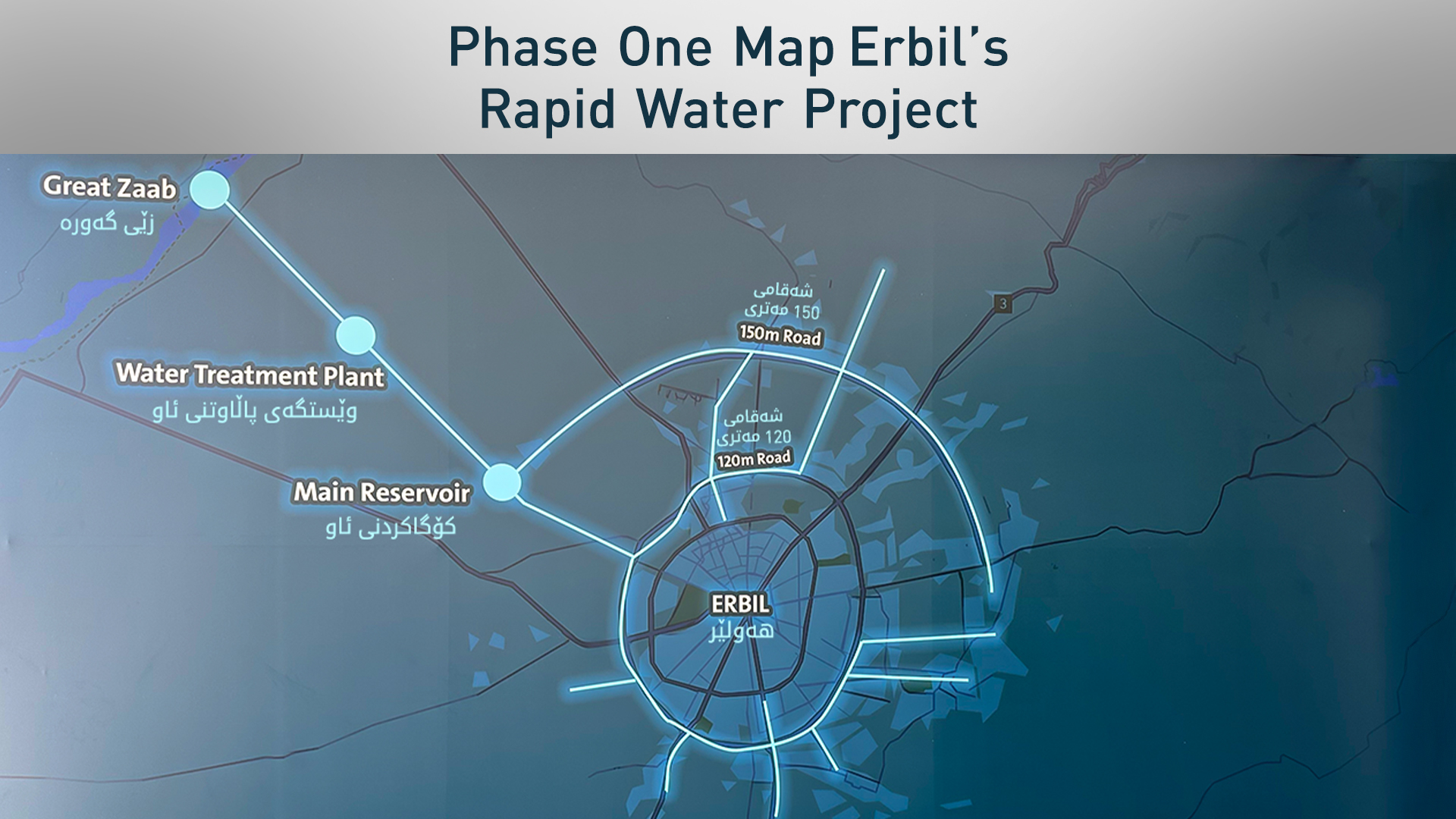Erbil Launches Emergency Water Project to Serve 152,000 Residents
PM Barzani inaugurates the first phase of a $480M project to solve Erbil's water shortages. Sourced from the Great Zab, it will provide clean water to 152,000 subscribers initially, eventually ending shortages for 30 years and conserving groundwater by closing over 1,000 wells.

By Kamaran Aziz
ERBIL (Kurdistan 24) – In a milestone moment for the Kurdistan Region's capital, Prime Minister Masrour Barzani today inaugurated the first operational phase of the ambitious Erbil Emergency Rapid Water Supply Project, a massive infrastructure initiative designed to permanently resolve the city's long-standing water shortages for decades to come. The launch ceremony, held at 10:00 AM on Sunday, marks the culmination of a year of intensive work and the beginning of a new era of water security for hundreds of thousands of residents.
The project, which saw its foundation stone laid by the Prime Minister on Sept. 8, 2024, represents a monumental investment by the Kurdistan Regional Government. With a budget of nearly 480 million dollars and an aggressive implementation timeline of less than 550 days, the initiative promises to completely solve Erbil’s water deficit for the next 30 years upon its full completion.
Work on the project officially commenced on July 20, 2024, and is on track to be fully finished by the end of this year. The activation of this first phase will immediately alleviate the chronic water issues that have plagued numerous neighborhoods, providing a continuous supply of clean, potable water to an area with approximately 152,000 subscribers.
Rabar Hussein, the Director of Erbil Water, previously highlighted the critical need for this project in an interview with Kurdistan24. "The area currently reached by the Emergency Rapid Water Project has approximately 152,000 subscribers," Hussein stated. "We used to face significant problems in this area annually because it relied on well water, and the wells either had electricity issues or their water levels had dropped."
The new system is engineered to be a definitive solution. "This project operates continuously, 24 hours a day," he added, outlining the operational strategy. "We plan to provide water to citizens 24 hours a day, but according to people's needs. We might provide water for 24 hours every other day; this will become clear as we balance the network. Our responsibility is to deliver the water to the citizens with global quality and standards."
The comprehensive project draws its source from the Great Zab River at an intake unit located in the village of Kawrgosk. From there, the raw water is pumped to a state-of-the-art treatment plant, where it undergoes several meticulous stages of purification, filtration, and chlorination, ensuring it meets the stringent standards of both the World Health Organization (WHO) and Iraqi national guidelines.
Once treated, the water is propelled through two large pipes to a main distribution hub in the Seberan area. This critical facility includes four large reservoirs and a balance tank, boasting a combined storage capacity of 100,000 cubic meters. From this central point, clean water is then dispatched through three main pipes into the city's network. The completed section of this network is located along the outer edge of the 120-meter highway, stretching from the Rashkin road area toward the Mosul road, and extending to the Kasnazan road.
The sheer scale of the project is reflected in the materials used: 200 kilometers of robust spiral pipes and 280 kilometers of durable ethylene pipes of varying diameters are being used to connect the system to Erbil's neighborhoods.
Upon its full completion, the project will treat 480,000 cubic meters of water daily and provide 20,000 cubic meters of clean water per hour across the city. This massive increase in capacity will not only end the shortages but will also have a profound positive environmental impact, allowing for the decommissioning of more than a thousand water wells. This strategic move is designed to protect and conserve Erbil’s vital groundwater reserves for future generations.
In this inaugural phase, residents of dozens of neighborhoods will see immediate relief. The areas set to receive a continuous supply of clean water include: Rashkin, 32 Park, Turaq, Alan City, Diyari City, Baghlumnara, Mamzawa, Qatawi, Zhyan, Roshnbiri, Fermanberan, Zaytun City, Daratu, Bnaslawa, Hiran City, Altun City, Galawezh, Awenay Shar, Berkoty Nwe, Ta'jily Nwe, sectors 8 and 5 of Hasarok, Hawkarī, Kasnazan, Zilan, Lawan, Ainday Du, Andazyaran, Ashti, and Qalaty Nwe.